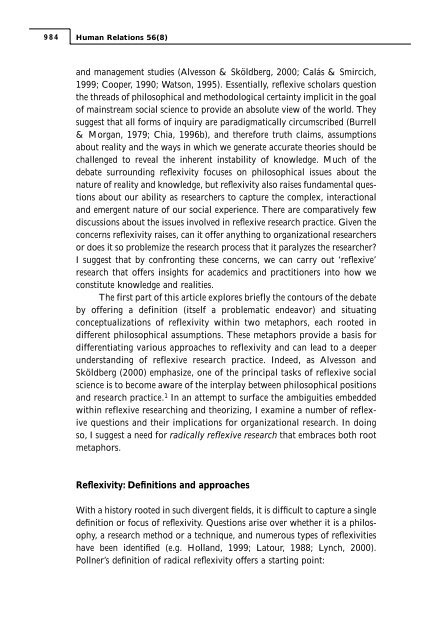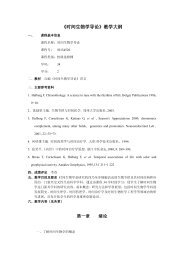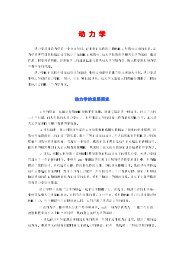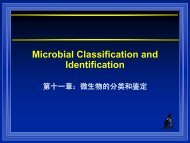Reflexive inquiry in organizational research: Questions and ...
Reflexive inquiry in organizational research: Questions and ...
Reflexive inquiry in organizational research: Questions and ...
Create successful ePaper yourself
Turn your PDF publications into a flip-book with our unique Google optimized e-Paper software.
984<br />
Human Relations 56(8)<br />
<strong>and</strong> management studies (Alvesson & Sköldberg, 2000; Calás & Smircich,<br />
1999; Cooper, 1990; Watson, 1995). Essentially, reflexive scholars question<br />
the threads of philosophical <strong>and</strong> methodological certa<strong>in</strong>ty implicit <strong>in</strong> the goal<br />
of ma<strong>in</strong>stream social science to provide an absolute view of the world. They<br />
suggest that all forms of <strong><strong>in</strong>quiry</strong> are paradigmatically circumscribed (Burrell<br />
& Morgan, 1979; Chia, 1996b), <strong>and</strong> therefore truth claims, assumptions<br />
about reality <strong>and</strong> the ways <strong>in</strong> which we generate accurate theories should be<br />
challenged to reveal the <strong>in</strong>herent <strong>in</strong>stability of knowledge. Much of the<br />
debate surround<strong>in</strong>g reflexivity focuses on philosophical issues about the<br />
nature of reality <strong>and</strong> knowledge, but reflexivity also raises fundamental questions<br />
about our ability as <strong>research</strong>ers to capture the complex, <strong>in</strong>teractional<br />
<strong>and</strong> emergent nature of our social experience. There are comparatively few<br />
discussions about the issues <strong>in</strong>volved <strong>in</strong> reflexive <strong>research</strong> practice. Given the<br />
concerns reflexivity raises, can it offer anyth<strong>in</strong>g to <strong>organizational</strong> <strong>research</strong>ers<br />
or does it so problemize the <strong>research</strong> process that it paralyzes the <strong>research</strong>er<br />
I suggest that by confront<strong>in</strong>g these concerns, we can carry out ‘reflexive’<br />
<strong>research</strong> that offers <strong>in</strong>sights for academics <strong>and</strong> practitioners <strong>in</strong>to how we<br />
constitute knowledge <strong>and</strong> realities.<br />
The first part of this article explores briefly the contours of the debate<br />
by offer<strong>in</strong>g a def<strong>in</strong>ition (itself a problematic endeavor) <strong>and</strong> situat<strong>in</strong>g<br />
conceptualizations of reflexivity with<strong>in</strong> two metaphors, each rooted <strong>in</strong><br />
different philosophical assumptions. These metaphors provide a basis for<br />
differentiat<strong>in</strong>g various approaches to reflexivity <strong>and</strong> can lead to a deeper<br />
underst<strong>and</strong><strong>in</strong>g of reflexive <strong>research</strong> practice. Indeed, as Alvesson <strong>and</strong><br />
Sköldberg (2000) emphasize, one of the pr<strong>in</strong>cipal tasks of reflexive social<br />
science is to become aware of the <strong>in</strong>terplay between philosophical positions<br />
<strong>and</strong> <strong>research</strong> practice. 1 In an attempt to surface the ambiguities embedded<br />
with<strong>in</strong> reflexive <strong>research</strong><strong>in</strong>g <strong>and</strong> theoriz<strong>in</strong>g, I exam<strong>in</strong>e a number of reflexive<br />
questions <strong>and</strong> their implications for <strong>organizational</strong> <strong>research</strong>. In do<strong>in</strong>g<br />
so, I suggest a need for radically reflexive <strong>research</strong> that embraces both root<br />
metaphors.<br />
Reflexivity: Def<strong>in</strong>itions <strong>and</strong> approaches<br />
With a history rooted <strong>in</strong> such divergent fields, it is difficult to capture a s<strong>in</strong>gle<br />
def<strong>in</strong>ition or focus of reflexivity. <strong>Questions</strong> arise over whether it is a philosophy,<br />
a <strong>research</strong> method or a technique, <strong>and</strong> numerous types of reflexivities<br />
have been identified (e.g. Holl<strong>and</strong>, 1999; Latour, 1988; Lynch, 2000).<br />
Pollner’s def<strong>in</strong>ition of radical reflexivity offers a start<strong>in</strong>g po<strong>in</strong>t:













![第10 ç« æ¢ç弯æ²åºåMPa 30 MPa 36 kN/m 5.4][ = q = ][q](https://img.yumpu.com/29939822/1/184x260/c10-c-aeca-1-4-aeaampa-30-mpa-36-kn-m-54-q-q.jpg?quality=85)


